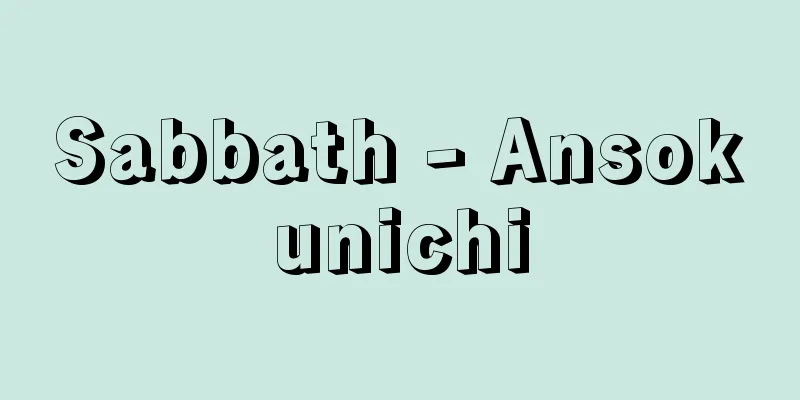Sabbath - Ansokunichi

|
〘Noun〙① A holy day in Judaism. The name given to the seventh day of the week based on the description in the Old Testament - Genesis that God rested on the seventh day after creating the heavens and the earth. From sundown on Friday to sundown on Saturday. People rest from work and perform religious ceremonies. Ansokubi. *Complete Old Testament (1888), Exodus IX: "Jehovah has given you a sabbath (ansokunichi) ."② A day that Christians take as a holy day, rest from work, and perform ceremonies. The Sunday on which Christ was resurrected and other designated days. Ansokubi. [Wa-Ei Rin-Shusei (First Edition) (1867)] [Glossary] (1) A borrowing of Christian terms translated from China. It appears as a translation of words such as sabbath in major English-Chinese dictionaries of the 19th century. It was introduced to Japan through these dictionaries. (2) The oldest reading is Ansokunichi (early Meiji period), followed by Ansokujitsu (mid Meiji period), and finally Ansokubi (late Meiji period). In addition, Catholics called it "Ansokujitsu" and Protestants called it "Ansokunichi," but nowadays there is a tendency to unify it to "Ansokunichi." Ansoku-jitsu [Sabbath]SabbathSource: The Selected Edition of the Japanese Language Dictionary About the Selected Edition of the Japanese Language Dictionary Information |
|
〘名〙① ユダヤ教での聖日。神が天地を創造し終えて第七日めに休息したという「旧約聖書‐創世記」の記述に基づいて、一週の第七日に与えた名称。金曜日の日没から土曜日の日没まで。仕事を休み、宗教的儀式を行なう。あんそくび。※旧約全書(1888)出埃及記「エホバなんぢらに安息日(アンソクニチ)を賜へり」② キリスト教徒が聖日として、仕事を休み、儀式を行なう日。キリストが復活した日曜と、その他定められた日。あんそくび。〔和英語林集成(初版)(1867)〕[語誌](1)中国で訳されたキリスト教用語の借用。一九世紀の主要な英華辞書に、sabbath などの訳語として見える。日本にはこれらの辞書を通じて伝来。 (2)読みは、アンソクニチが最も古く(明治初期)、ついでアンソクジツ(明治中期)、最後にアンソクビ(明治後期)が生まれたと思われる。また、カトリックでは「あんそくじつ」、プロテスタントでは「あんそくにち」といっていたが、現在では「あんそくにち」に統一される傾向にある。 あんそく‐じつ【安息日】あんそく‐び【安息日】出典 精選版 日本国語大辞典精選版 日本国語大辞典について 情報 |
Recommend
Kugusuge - Kugusuge
...The main species of Cyperus spp., such as Cype...
Wild Goose Bath - Ganburo
〘Noun〙 A custom said to involve gathering up falle...
Citric acid (Kuensan)
A type of tribasic hydroxycarboxylic acid. It is t...
King Xiaogong
381 - 338 King of the Warring States period in Chi...
The Story of Sagoromo
A story from the mid-Heian period. The author has...
Nestor meridionalis (English spelling)
… [Takashi Saito]. . . *Some of the terminology t...
Eugène Dabit
French novelist. Born in the working-class neighb...
Komimai - Komimai
In the Edo period, when paying rice as tax, an ext...
Abnormal corpse - I want to fix it
A corpse where the cause or circumstances of death...
Echelle - Echelle
…α in the figure is called the blaze angle, and t...
Allodium - Allodium
…In Old Norse, óðal, in Anglo-Saxon, êðel. The Ol...
Iconoclastic Decree - Iconoclastic Decree
→ Iconoclasm Source : Heibonsha Encyclopedia About...
Babylonian Exile
When the Kingdom of Judah, an ancient Israelite n...
Woven hat - Amigasa
A hat made by weaving stalks of rush grass, rice ...
Azuma Yadori - Azuma Yadori
Please see the "Bowserbird" page. Sourc...









